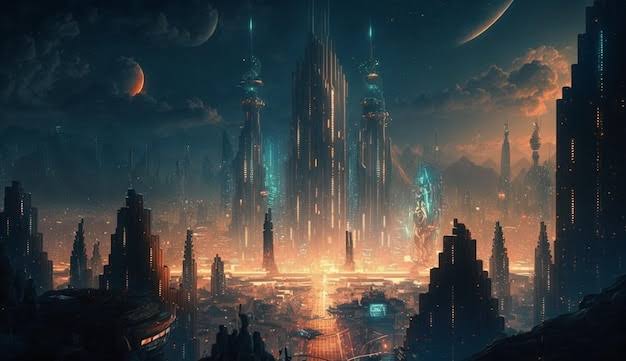
By Adunni Omoalata
As children, we were inundated with several genres of movies from fantasy to comedy, family comedy especially, to adventure, horror, drama, documentary, animation, thrillers, historical, biographical, and action movies just to mention a few. However, one particular genre that stood out for me was Science Fiction.
Science fiction is a movie genre that explores imaginative and speculative concepts about the future or alternate realities. It often combines scientific and technological elements with fictional storytelling to create a world that is different from our own.
Science fiction movies are sometimes set in outer space, dystopian societies, or advanced technological civilizations, and they often involve futuristic technology, alien life forms, time travel, or other scientific concepts that push the boundaries of what is currently possible. They also analyse fictional, realistic and non-realistic views of the observable universe.
One of the key characteristics of science fiction as a movie genre is its ability to raise thought-provoking questions about the impact of science and technology on society, ethics, and the human condition.
By envisioning possible future or alternate realities, science fiction films often serve as a mirror for contemporary issues or provide contrasting realities. It sometimes addresses topical issues such as the implications of artificial intelligence, the consequences of environmental destruction, or the nature of human identity in an increasingly digital world.
Science fiction also often delves into themes of exploration and discovery, as characters venture into uncharted territories, encounter extraterrestrial life forms, or grapple with the ethical dilemmas posed by scientific advancements.
This sense of curiosity and wonder is a defining characteristic of the genre as it invites audiences to contemplate the possibilities of what lies beyond the realm of known science and conventional wisdom.
Moreover, science fiction as a movie genre can captivate audiences with its visual effects, futuristic landscapes, and imaginative world-building.
Whether it’s creating awe-inspiring alien civilizations, depicting advanced technological systems, or portraying the wonders of space exploration, science fiction films often push the boundaries of visual storytelling and transport viewers to new and immersive cinematic experiences.
Science fiction often blurs the lines between imagination and what’s possible.
Some movies have eerily foreshadowed real-world advancements, making them fascinating case studies of technological and societal trends.
Here are some prominent examples:
On Communication Technology
2001: A Space Odyssey was released in April 1968. This Kubrick masterpiece showcased futuristic video calls, tablets, and artificial intelligence, all of which are commonplace today.
Minority Report is a 2002 film featuring a PreCrime police who stop crimes before they take place, with the help of three ‘PreCogs’ who can foresee crimes. Imagine a system that allows the government or the police department to envisage a crime before it is committed. This system is enabled by pre-crime units utilizing precognitive individuals which weirdly, resonates with modern-day facial recognition and predictive policing algorithms that allow for preemptive protocol for crime management.
In the area of biotechnology and medicine,
Gattaca which was released in 1997 explores the complex world of genetic engineering and designer babies. Concepts such as this were once relegated to fiction but most of which are now topics of intense scientific discussion and ethical controversy in our current history thereby mimicking and mirroring the exact theme of this movie.
The idea of bioengineered humanoids and robots who were called replicants became mainstream at the release of Blade Runner in 1982. Therefore the unique features blurring the lines between human and machine no longer seem fantastical or idealistic.
These advancements in robotics and artificial intelligence raised awareness about consciousness and what defines “humanity” in the quest to apply technological genius in aspects of our social and human evolution.
Star Wars released in 1977 presents a glimpse into space exploration and colonization.
It explores space travel to distant planets, intergalactic trade, and even laser weaponry may seem outlandish, but ongoing space exploration efforts, private space companies, and the development of directed-energy weapons show that the dream of reaching the stars isn’t entirely science fiction and will very much become part of a normal human experience.
This film, The Martian which was released in 2015, realistically portrayed astronaut survival on Mars, inspiring real-world missions like NASA’s Mars 2020 Perseverance rover. The possibility of colonizing Mars is no longer just a sci-fi trope, but a serious scientific and technological endeavour
Environmental and Societal Shifts
Mad Max released in 1079 is a movie about a dystopian wasteland ravaged by resource scarcity and climate change feels more relevant than ever with our increasing awareness of environmental issues and resource depletion.
The Matrix a 1999 movie represents the blurred lines between the real and virtual worlds that are becoming increasingly relevant with the rise of virtual reality, social media, and the potential for advanced simulation technology.
Beyond Technology
Sci-fi films go beyond just gadgets and gizmos, often predicting and prompting societal shifts. For example, films like “Blade Runner” and “Metropolis” tackled social inequality and class issues that remain relevant today. Similarly, “Star Trek” portrayed a future of diversity and inclusivity, inspiring generations to work towards a more equitable society.
Looking Forward
While some predictions haven’t come true yet ie flying cars, the line between sci-fi and reality continues to blur.
Advancements in artificial intelligence, gene editing, and space exploration hold the potential to reshape our world in ways we can only imagine. The key is to learn from the cautionary tales and hopeful visions presented in sci-fi films, shaping our technological advancements with ethical consideration and a focus on human well-being.
Ultimately, science fiction as a movie genre offers a unique blend of speculative storytelling, scientific exploration, and visual creativity, making it a compelling and enduring genre that continues to inspire and challenge audiences with its imaginative visions of the future.
As we revel in the beauty and ingenuity of SciFi Movies and their uncanny ability to give us a sneak peek into an almost impossible world that is defined by a “never been heard before or ever thought of phenomenon”, remember, this is just a glimpse into the vast universe of sci-fi-to-reality connections and that every Sci-Fi movie offers us a unique window into the potential future, and that science in more ways than religion has proven to be an actual window into the future not weak, recycled and vague prophecies yearly delivered by delusional merchants of faith seeking fake relevance and selling hope to an equally weak and morally bankrupt




Comments (2)
Reginald Dokubosays:
February 13, 2024 at 5:50 pmExcellent article. As you rightly said, “SCI-FI IS A WINDOW INTO THE FUTURE”
Wisdom A. Petersays:
July 11, 2024 at 2:46 pmI have observed this same pattern for some time now. And I have also thought of the dangers of technology on the world, as sometimes shown in the movies; where robots blended with AI become uncontrollable even by their creators, and end up waging a war with humans.